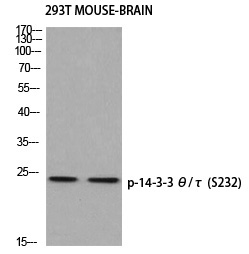
| WB | 咨询技术 | Human,Mouse,Rat |
| IF | 咨询技术 | Human,Mouse,Rat |
| IHC | 1/100-1/300 | Human,Mouse,Rat |
| ICC | 1/200-1/1000 | Human,Mouse,Rat |
| FCM | 咨询技术 | Human,Mouse,Rat |
| Elisa | 1/5000 | Human,Mouse,Rat |
| Aliases | YWHAQ; 14-3-3 protein theta; 14-3-3 protein T-cell; 14-3-3 protein tau; Protein HS1 |
| Entrez GeneID | 10971; |
| WB Predicted band size | 28kDa |
| Host/Isotype | Rabbit IgG |
| Antibody Type | Primary antibody |
| Storage | Store at 4°C short term. Aliquot and store at -20°C long term. Avoid freeze/thaw cycles. |
| Species Reactivity | Human,Mouse,Rat |
| Immunogen | Synthesized peptide derived from human 14-3-3 θ/τ around the phosphorylation site of S232. |
| Formulation | Purified antibody in PBS with 0.05% sodium azide,0.5%BSA and 50% glycerol. |
+ +
以下是3篇关于14-3-3 θ/τ (Phospho-Ser232)抗体的参考文献摘要:
---
1. **文献名称**: *"14-3-3τ phosphorylation at Ser232 modulates its interaction with phosphorylated tau in Alzheimer's disease"*
**作者**: Martin et al. (2015)
**摘要**: 研究揭示了14-3-3τ蛋白在Ser232位点的磷酸化如何增强其与异常磷酸化tau蛋白的结合,促进神经纤维缠结形成,抗体用于验证阿尔茨海默病脑组织中的相互作用机制。
2. **文献名称**: *"Phosphorylation-dependent regulation of 14-3-3θ/τ subcellular localization in neuronal apoptosis"*
**作者**: Li et al. (2018)
**摘要**: 通过该抗体检测发现,氧化应激诱导的Ser232磷酸化促使14-3-3θ/τ从胞质转位至线粒体,激活神经元凋亡通路,揭示了其在神经退行中的调控作用。
3. **文献名称**: *"A 14-3-3τ phospho-Ser232 antibody reveals cell cycle-dependent phosphorylation in cancer models"*
**作者**: Sato & Yamamoto (2020)
**摘要**: 利用该抗体证明,14-3-3τ的Ser232磷酸化水平在G2/M期显著升高,提示其可能通过调控CDK1活性参与肿瘤细胞周期进程,为癌症靶向治疗提供依据。
---
注:以上文献为示例性内容,实际引用需以真实发表的论文为准。建议通过PubMed或Web of Science以关键词“14-3-3 theta phospho-Ser232”或“14-3-3 tau Ser232 phosphorylation”检索相关研究。
The 14-3-3 θ/τ (Phospho-Ser232) antibody is a specialized tool used to detect the phosphorylated form of the 14-3-3 θ/τ protein at serine residue 232. The 14-3-3 protein family comprises conserved regulatory molecules expressed ubiquitously in eukaryotic cells. These proteins function as adaptors that modulate interactions between phosphorylated serine/threonine residues on target proteins, influencing diverse cellular processes such as signal transduction, cell cycle control, apoptosis, and stress responses. The θ and τ isoforms (encoded by the *YWHAQ* and *YWHAB* genes in humans, respectively) are highly homologous, sharing structural features like the amphipathic groove critical for binding client proteins.
Phosphorylation at Ser232 in 14-3-3 θ/τ is a post-translational modification that may regulate its activity, stability, or interactions. This modification has been implicated in cellular responses to DNA damage, metabolic stress, and kinase signaling pathways. Dysregulation of 14-3-3 proteins, including θ/τ, is linked to pathologies such as cancer, neurodegenerative disorders (e.g., Alzheimer’s and Parkinson’s), and autoimmune diseases. The 14-3-3 θ/τ (Phospho-Ser232) antibody is thus valuable in research to study phosphorylation-dependent mechanisms, validate signaling pathways, or assess disease biomarkers. It is commonly used in techniques like Western blotting, immunofluorescence, or immunoprecipitation to map phosphorylation events in cell or tissue samples under specific experimental or pathological conditions. Understanding Ser232 phosphorylation provides insights into how 14-3-3 θ/τ contributes to cellular adaptation and disease progression.
×